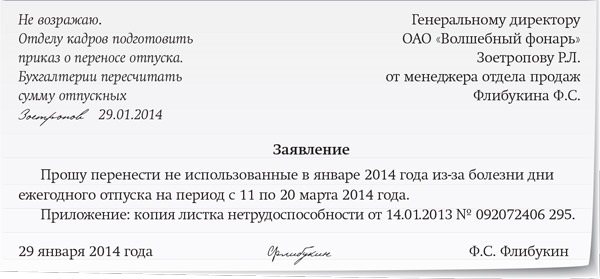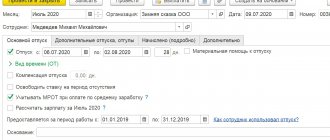Last modified: January 2021
The right to rest is enshrined in legislation simultaneously with the right to work. The excitement around the untimely use of vacation time will soon exclude this type of vacation from the category of rights, transferring it to the category of responsibilities. The transfer of vacation to the next year is carried out on the basis of the desire of one of the parties to social and labor relations, expressed in writing, orally, or not documented at all.
Prohibition on transferring vacation periods
Whether the vacation carries over to the next year or another period agreed upon by the parties is determined by the type of vacation right granted. Vacation transfers are not subject to transfer and will expire if not used in a timely manner:
- Study leave. Despite the obligation to provide it to employees who combine educational and work processes, the basis for provision is a summons certificate sent by the educational institution. The document indicates the period for passing sessional material, entrance or state exams, preparation and defense of the thesis. Even in the event of an employee’s illness, if the employer wishes, without a new call with rescheduled dates, rescheduling is impossible.
- Maternity leave. The end of the period is determined by the child reaching the age limit and does not depend on the fact of using the granted right to leave or refuse and prefer the labor process. Leave is not transferred because the basis (age of the child) does not move in the opposite direction.
- Leave without pay. The type of rest does not require mandatory provision by management, but relates exclusively to the rights of a citizen. A ban on transferring vacation is equivalent to a reluctance to exercise the right given at the current time.
The transfer of leave is determined by the mandatory provision or additional factors (children under 3 years of age, an invitation to submit educational material) for each year worked and the right to receive monetary compensation for non-use.
Transfer of vacation at the request of the employee and employer
The appointment of a new date is permissible at the request of the worker if he has a certificate of incapacity for work on the date appointed in advance . This reason is allowed by paragraph 2 of part 1 of Article 124 of the Labor Code of the Russian Federation.
The second case when a working holiday can be extended or postponed to a new date is when the vacationer performs duties in relation to the state, for which he is granted exemption from his position for the necessary time. Sometimes a shift in leave may be regulated by a contract concluded upon taking up a position.
An organization can draw up an application for setting a new date for vacation time due to its unlawful actions . The shift can be made due to a long transfer of funds, which must be credited to the employee’s account no later than three days before his departure, as stated in Article 136 of the Labor Code of the Russian Federation.
Also, the basis for the transfer may be untimely notification of the employee about the vacation. According to the Labor Code, he must be warned about this 14 days before going on vacation, which is provided for in Part 2 of Article 124 of the Labor Code of the Russian Federation.
In exceptional cases , it is allowed to postpone an employee’s vacation if, without his absence, the labor process would be completely stopped.
For more information on how to draw up a sample application for transferring vacation to another date for various circumstances, read the article at the link.
Transfer or compensation
The minimum duration of annual vacation time, regardless of the conditions of performance of duties and the form of the concluded individual agreement in accordance with Article 115 of the Labor Code of the Russian Federation, is equal to 28 calendar days for each fully worked year. The category of citizens, the presence of unfavorable production and climatic factors and the terms of the collective agreement can increase the rest time.
Extended main time is provided to the following persons in the following quantities:
- employees of preschool and educational institutions, social service enterprises and medical healthcare organizations – 42 (56);
- employees of state and municipal institutions – 30 (35);
- disabled people, regardless of group – 30;
- minors – 31.
Additional leaves in accordance with Articles 116-119 of the Labor Code of the Russian Federation are provided for irregular work, harmfulness and the special nature of the performance of duties in a quantitative equivalent determined by the degree of exposure to adverse factors, the category of employees and the insurance period in a particular segment.
Article 126 of the Labor Code of the Russian Federation allows for the replacement of a part exceeding the 28-day period with monetary compensation if the employee wishes. If this year a citizen has not taken advantage of his vacation right and has not received monetary compensation, then the next vacation is automatically transferred to the next year.
It is prohibited to replace any vacation interval with cash other than termination of the employment contract (Article 126 of the Labor Code of the Russian Federation) for the following persons:
- pregnant women;
- minors;
- engaged in work in hazardous conditions.
The employee has the right to choose whether the vacation can be postponed to the next year or replaced with monetary compensation in terms of exceeding the specified 28 days and not belonging to the above categories. For example, transferring the balance of vacation to the next year is mandatory for a minor if it is not used in the current year, and a disabled person is allowed not to transfer the amount of vacation exceeding 2 days, but to receive a compensation payment.
Is it possible for an employer to postpone vacation to the next year?
The Labor Code of the Russian Federation does not establish how many times per year an employee or employer can postpone vacation. Thus, it turns out that you can transfer your vacation several times a year.
Citizen Portnova must go on vacation from March 1 to March 28. It turned out that in the period until March 9 she was on sick leave. Having returned to work on March 10, she wrote a personal statement and asked to reschedule her vacation to another time. She did not indicate a time frame.
The accountant suggested that Portnova go on vacation from June 1 to June 28. This period suited her. She was on vacation when on June 11 her employer sent her on an urgent business trip. Portnova agreed, but wrote an application to postpone part of the remaining vacation.
Transfer period
Let us note one more nuance. Vacation cannot be transferred to the next year. It must be used within 12 months.
For example, if an employee must go on vacation from April 2018, then he must necessarily take the rest period from April 2021 to April 2021.
Transfer time
Vacation can be postponed for an indefinite period - but no more than 2 years. An employee has every right to choose when he needs to go on vacation.
The employee must submit a written request to the secretary - or directly to the employer. The document should indicate the reason for the transfer and the timing.
It is better to discuss the transfer period in advance with your superiors, agree on it, and then include it in the application.
We invite you to read: Academic leave for family reasons reasons
The appeal can be submitted in any form. The main thing is that the request and the reasons for the transfer are indicated.
The employee may be held accountable for violating labor discipline.
For example, for a long absence from the workplace, more than 4 hours.
- The employee went on vacation without approval.
- The citizen did not return to work after sick leave and did not provide a certificate of incapacity for work.
- The employee arbitrarily divided his vacation into parts and decided to postpone his rest days to another time.
The time when the employee is absent will be considered absenteeism. For this, a specialist can be fired, or given a reprimand or reprimand (Article 192 of the Labor Code of the Russian Federation, Article 81 of the Labor Code of the Russian Federation).
But if a citizen goes to work on vacation, he will not be paid for his work. Of course, if he has not agreed on this point with management. Typically, the employee is given notice to return to work.
Try to talk to your manager and find out why you can’t reschedule your vacation.
If there are real reasons, ask them to eliminate them.
Please note that the employee has the right to go on vacation according to the schedule if he is denied a transfer, and receive the due compensation.
You must receive a response in writing if you submitted your application in writing.
There is a branch in almost every city in Russia.
Find out where the labor inspectorate is located and write a written complaint. Submit it along with a copy of the refusal received from your supervisor.
Please also attach a written refusal from your superiors to your application.
If the labor inspectorate delays with the question, you can send a complaint to the Prosecutor's Office without waiting for an answer.
- The employee may initially receive compensation and then go on vacation.
- An employee must receive compensation 3 days before going on vacation.
- The specialist can return the money voluntarily.
- The refund can be recorded in the Order.
- Average earnings are “taken” for the year.
- If there was no earnings, then the previous period is taken into account. This may be if the employee was on maternity leave for up to 3 years.
- A citizen can go to work during vacation, ask for a transfer of days worked, but will not return compensation. It's his right.
We wrote more about calculating vacation pay - read our article here. In it you will find different formulas and calculation examples.
Still have questions? Just call us:
LLC "Katyusha"
Mikhailova V.N.
Annual rest is guaranteed to all employees, regardless of the type and legal form of the company where they work. This norm is enshrined in the provisions of Art. 114 Labor Code of the Russian Federation. Also see “Procedure for granting annual paid leave”.
The sequence in which the company's personnel will be absent from work is, in practice, fixed by a special vacation schedule. According to the rules, it is drawn up 14 days before the new calendar year and approved on behalf of the manager. From this moment on, the schedule becomes mandatory for the organization’s personnel.
It is clear that it is impossible to flawlessly plan the future vacation of all company employees. Thus, in large organizations there is a constant rotation of personnel, and in small firms the illness or dismissal of one of the employees can jeopardize compliance with the schedule as a whole. Also see "Vacation Schedule".
To ensure that the guaranteed vacation does not disappear and continues for the time established by law for workers in this category, it is permissible to postpone the vacation. The reasons for changing the start date of the holiday may be:
- by necessity;
- illness or injury confirmed by a certificate of incapacity for work;
- performance of government duties;
- late payment of vacation;
- notification to the employee of the start of the vacation later than two weeks or lack of appropriate notification;
- other cases provided for by Russian legislation.
A special document will help notify the employer of a change in the start date of the vacation - an application to transfer the vacation to the next year. Every employee who does not have the opportunity to go on vacation during the planned period of time is required to write it.
Renewal and transfer
Vacation entitlements that were interrupted or not used in accordance with a predetermined schedule can be used in the future. Extension or transfer of annual paid leave to another period in accordance with Article 124 of the Labor Code of the Russian Federation is carried out when situations arise:
- Diseases of the insured person. Temporary disability shifts the vacation interval only if it arises for the employee himself; the need to care for a sick or injured relative during vacation does not imply an extension of vacation time and is not subject to compensation.
- Performing government duties during vacation time. The transfer of part of the annual leave at the initiative of the employee is allowed if the regulatory acts exempt the process from the main job.
- Late payment or lack of warning about the start of the vacation interval. Failure by management to notify the fact two weeks before the start of the event or failure to pay money three days before the start of the holiday gives the right to postpone the annual leave at the initiative of the employee to the date specified in the application.
- Production orientation and necessity. When a specialist is recalled from vacation or in the presence of unfavorable factors, when the absence can negatively affect the activities of a business entity, with the consent of the employee, transfer of annual leave to the next year is allowed. The unused right must be exercised within 12 months after the actual end of the year for which the vacation is intended.
Paid vacation time provided for by law is not lost or burned. Whether unused vacation carries over to the next year depends on the duration used, the employee’s status and the conditions of internal documentation. How to transfer a vacation? The fact of non-use and non-receipt of compensation carries out the transfer automatically.
If an employee who was not included in the group prohibited from being replaced by compensation took the standard 28 days off, and for the rest of the period received money as a compensation payment, then there is simply nothing to transfer. If 28 days of the main rest or a part are not used in the current period, regardless of the wishes of the parties, a transfer is made. But the answer to the question: whether the additional leave is transferred to the next year depends on whether the citizen received or refused compensation, with the exception of work in hazardous conditions.
Compensation instead of vacation?
In some cases, vacation not taken can be compensated with money, however, this procedure is limited by legal norms.
A person is not entitled to receive compensation if the unused period does not exceed 28 days. This rule is based on a clear statement of the law - every employee has the right to paid leave every year and can exercise this right based on the provisions of the Labor Code.
In the following situations, compensation is still possible if it concerns:
- parts of additional leave exceeding 28 days;
- days accumulated since the previous year.
Thus, during the period of work, receiving money instead of the usual regular vacation is prohibited by law. The exception is cases of dismissal, when transferring the vacation to a new period is no longer possible.
Unused vacation upon dismissal
Despite the law obliging employees to go on paid leave, situations may arise where, at the time of dismissal, an employee has accumulated unused rights to subsequent vacations over several years.
Only in case of dismissal, the employee has the right to receive monetary compensation for the entire unused period. While the employee is on the payroll, such compensation for refusal to take leave for several years is not subject to payment.
If the employee continues to work, the unused portion can only be added to the new accumulated rest period in the following year.
If, upon dismissal, an employee is faced with a refusal to pay for the entire vacation period, the quitter must contact the labor inspectorate. In response to his request, an inspection will be scheduled. If it is discovered that a person has not taken vacation for a long period, the company will be held administratively liable with a fine of 50 thousand rubles and full repayment of the missed vacation with monetary compensation.
Is it possible to transfer at the initiative of the employer?
Article 124 of the Labor Code of the Russian Federation contains an important rule for employers: failure to provide leave for more than two years in a row is prohibited. If an employee rests less frequently, this will be a violation of labor laws for the employer. If the labor inspectorate finds out about this, liability will follow in the form of a fine.
Thus, in order to protect itself from violations, the employer needs to ensure that employees take rest at least once every 2 years.
As for the employee, he does not incur any losses from the transfer of vacation to subsequent years. The annual vacation does not expire and is not lost.
If it is not used in the current year, it will be used in the next or subsequent year. And if during the entire period of work the employee does not take the allotted vacation time, then he will be able to receive monetary compensation for unused days.
Can an employer initiate the transfer of annual leave? Management may offer the employee to postpone his vacation to another period or to the next year, but this procedure can only be formalized in one case - if the employee has given his consent.
A proposal (notification) to postpone vacation days for an employee is drawn up in writing. The employee’s consent (or refusal) must also be obtained in writing - either a mark is placed on the notification form, or the employee writes a statement of consent.
If written consent to postpone the vacation is not received, then the employer, on his own initiative, unilaterally does not have the right to postpone the vacation time.
If the worker agrees, an order is issued indicating new terms for the provision of rest. Changes are being made to the vacation schedule.
The reason for the transfer at the initiative of the employer is usually production necessity, which may conceal the need to be present at work due to:
- absence of a partner (fell ill, took leave at his own expense);
- heavy workload due to seasonality, large influx of buyers and clients;
- introduction of new equipment, production lines, etc.
The list of reasons is unlimited, but regardless of why the employer needed to reschedule the employee’s vacation, before doing this, you need to make sure the employee’s consent.
Additional paid time off
Certain categories of workers have the right to additional days of paid leave (teachers, doctors, civil servants, disabled people working in harmful and dangerous conditions, with irregular hours, and other categories). Days are paid according to the same rules as the main part of the annual vacation.
However, additional leave differs from the main leave in that the first can be replaced with monetary compensation, and the second must be taken off. Compensation for the main part can only be received upon dismissal.
Is it possible to transfer additional vacation days? The answer to this question depends on what the additional days are provided for, what conditions are stipulated in the employment contract with the employee, and the internal local acts of the organization.
In general, the Labor Code of the Russian Federation does not contain a direct prohibition on the transfer of additional days of paid leave.
The duration of annual leave is always specified in the employment contract; if additional days are provided, this is also stipulated in the terms of the agreement. Employers often add whether these days can be transferred to the next year or not.
In fact, the prohibition on carryover in an employment contract is not correct. The Labor Code of the Russian Federation does not prohibit transfers. If the employee did not use additional vacation days, then they cannot be burned out; it is logical that the employee can either receive compensation for them, or take them off later - next year. If an employee wants to transfer additional vacation days, then he has every right to do so; to do this, it is enough to write an application.
Local acts also cannot establish a ban on transfers, since this will worsen the situation of workers in comparison with the conditions prescribed in the Labor Code of the Russian Federation, which is not allowed.
Documentation of the procedure
Before transferring your vacation to the next year, you must draw up a competent application.

- It is written in the name of the organization and the leader . Also, the surname and initials of the employee addressing the management are indicated first.
- In the next paragraph, you write the word “ Statement ” in the center with a capital letter.
- After this, the reason for assigning a new date . It is important to know that indicating one reason is not enough; you must attach a document confirming the possibility of transfer.
- At the end, the applicant’s signature , his personal details and the date of writing the application are placed.
The director must put his resolution confirming permission to postpone the vacation. In the resolution, management must indicate its characteristics, this is what should be done and in relation to whom. In addition, the scope of the task must be indicated, the director’s signature and the date on which the resolution was drawn up must be indicated.
Attention ! If the employee simply extends his vacation, additional documents are not necessary .
In cases where the transfer is associated with a management error , they independently prepare all the documents. The employer must draw up an order indicating the reason for postponing the vacation and the new date. And the employee is obliged to read it and give consent.
Does unused vacation expire?
To figure out whether unused vacation is burned or not in 2021 is prompted by Russia’s ratification of the International Labor Organization convention, which provides for the retention of the employee’s right to annual paid rest only for 21 months.
Additionally
Upon dismissal, the employee has the right to all previously unused vacations. This right can be exercised by providing the employee with monetary compensation for the entire accumulated period. If there are few unused days, then the employer can send the employee on vacation, and only after that can fire him.
This ratification did not entail the adoption of amendments to the Labor Code of the Russian Federation and other regulations that do not provide for any burning of unpaid vacations.
According to the letter of Rostrud dated June 8, 2007 No. 1921-6, employees who have not taken vacation for several years still have the right to use all accumulated vacation days.
According to the Labor Code, the employer is obliged to annually provide each employee with continuous leave of at least 14 calendar days. The remaining days - both for the current year and previous ones - are divided arbitrarily (Article 125 of the Labor Code). Find out how you can divide your vacation according to the labor code here. This allows the employee to periodically take 1-2 days off without leaving the workplace for an extended period, and the employer to eliminate violations of labor legislation regarding paid leaves.
Transferring family leave
The legislation provides for the possibility of postponing leave for family reasons if the employee has not yet been paid as vacation pay, and also has not been notified of the imminent time of rest. The employer has every right to establish his own procedure for replacing vacation time in the organization, based on reasons that are considered valid.
Family circumstances are not a valid reason for changing the vacation time, however, in some situations, the organization’s management may accommodate the employee halfway if circumstances force him to take urgent leave. An example of such a situation could be a sudden illness of a close relative or one’s own disease, which is difficult to cure and leads to disability of the citizen in the future or today.
It will not be possible to obtain the right to change the start date of vacation due to one’s own wedding or the wedding of relatives, since these are not serious and compelling circumstances, and if the collective agreement allows employees to take unpaid leave for several days due to such celebrations, then the employee can take namely time off, without touching or changing annual paid leave.
In accordance with Art. 123 of the Labor Code of the Russian Federation, the priority of vacations is provided based on the appropriate schedule, which is adopted no later than two weeks before the new calendar year. At the same time, execution of the schedule is mandatory for each party to the labor relationship, therefore any changes to the existing plan must be formalized by mutual agreement of the parties.










